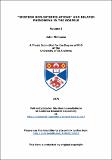"Western non-interpolations" and related phenomena in the Gospels
Abstract
This thesis is a critique of the theory of Western non-interpolations' propounded by Westcott and Hort, the famous British scholars in the Introduction to their critical edition of the Greek New Testament, 1881. The theory concerns eight cruces interpretum in the concluding section of Luke's Gospel and one in the last but one chapter of Matthew's Gospel. The eight Lukan passages, though missing from Codex Bezae (D) and its allies ('Western' family), are read by Codex Vaticanus (B) and Codex Sinaiticus (א) as well as by (p⁷⁵ and) the vast majority of the other ancient witnesses. (The pattern of the textual evidence for the Matthaean passage is rather different, although B and א are ranged against the omission shown by D). In these contexts Westcott-Hort decided to apply the principle of brevior lectio potior. This was indeed a radical departure from their low estimation of the 'Western' group in general vis-a-vis the B א (Alexandrian) group which they idealised as 'neutral' and as having a very high degree of purity. Having once rated the latter so high it was too awkward for our editors to admit that their favourite Text had gone corrupt at those crucial points. Hence they devised the face-saving term 'Western non-interpolations to emphasize that while their characterisation of the 'Western' Text as containing numerous 'interpolations' still held good, in the eight cases listed the 'Western' omissions were to be reckoned as real 'non-interpolations'. This 'writer believes that although Westcott-Hort's intuition regarding the eight passages was correct (except in
one instance), the premise from which they started needs to be revised. Omissions of NT texts including the above were caused by various factors. They are confined neither to one family, nor to a single Gospel, nor even to one particular area of a Gospel.
Westcott-Hort's inclusion of one Matthaean passage in the above 'classic' (the designation is mine)' category speaks for itself. Moreover, they also called attention to eighteen other ‘Western’ ‘omissions’ scattered 'across all the Gospels although they attached only a secondary degree of suspicion to the longer texts. I submit that it was our editors' creation of this subtle distinction between these two categories of readings, as also their exaggerated delineation of the 'purity' of the Alexandrian family as against the 'Western' that has given rise to various other theories regarding the editorial vicissitudes of the Third Gospel. In my first volume I examine the twenty-seven passages in question and conclude that out of the eighteen 'non-classic' ones, at least five in Mt represent genuine omissions. In volume II, seven other passages where Westcott-Hort detected the characteristic tendency of 'Western' witnesses, viz., that of 'expansion', are examined. Of these I recommend two for full reinstatement, two for partial reinstatement arid a fifth one for full reinstatement, though not in its traditional position. If these findings have any credibility, then Westcott-Hort's depiction of the 'Western' Text was indeed a gross exaggeration as far as the Gospels are concerned.
The Methdology of this thesis consists in a judicious application of the 'eclectic' principle. Each passage is studied on its own merits under three main heads:
1. External Evidence (Inferences to be drawn from MS data).
2. Internal Evidence:
a) Transcriptional Probability (The possible attitude of a scribe in inserting or rejecting a passage as the case may be; also the probabilities of accident behind a reading).
b) Intrinsic Probability (Considerations such as vocabulary, style and theological propensity of an author; also his general handling of his
sources. In fact the application of the principles of Source Criticism, Form Criticism and Redaction Criticism in deciding whether a reading suits its context or not).
3. Conclusion: It is emphasised that the External Evidence is to be carefully balanced against the Internal Evidence in establishing the authenticity or otherwise of a given text rather than reading one's pre-conceived notions into it. The contributions of outstanding commentators and textual critics over the span of about 90 years since Westcott-Hort's time have been critically examined in
drawing the inferences of each section.
The concluding chapter which is a summation of the above inference serves to highlight the fallacy of Westcott-Hort's pre-suppositions and of certain subsidiary theories and demonstrates why the theory, of’ Western non-interpolations’ should be discarded as a principle of Textual Criticism.
Type
Thesis, PhD Doctor of Philosophy
Collections
Items in the St Andrews Research Repository are protected by copyright, with all rights reserved, unless otherwise indicated.

